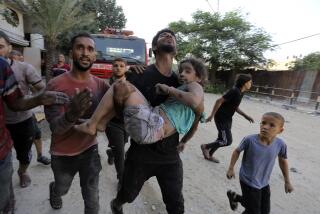Choosing the words in Middle East reporting
- Share via
Re “Telling it like it isn’t,” Opinion, Dec. 27
Robert Fisk bandies about terms such as “colonial” and “wall” with such certainty, while ignoring terms such as “terrorist,” “suicide bomber” and “security imperative.” The concrete portions of Israel’s security barrier represent about 3% of the total route; the rest is chain-link fence. So, yes, calling it a security fence or security barrier is indeed accurate. Moreover, this barrier is in response to a campaign of Palestinian terrorism that has left more than 1,000 Israeli civilians dead since 2000, and the number of successful attacks has plummeted in areas protected by this barrier.
Fisk decries the condemnation of Palestinians through labels but is quick to tar Israelis as colonialists and occupiers. Apparently, that to him is unbiased journalism. Fisk’s opinions may be appropriate for the Opinion pages, but such biased and predisposed narrative should not be confused with legitimate reporting.
AMANDA F. SUSSKIND
Director, Pacific Southwest Region
Anti-Defamation League
Los Angeles
*
It was with great surprise and pleasure that I read Fisk’s Op-Ed article about the language reporters are forced to use when reporting from the Middle East. As a Caucasian Protestant who has lived in Jerusalem and traveled in many Middle Eastern countries, I could not believe that finally the truth was being told.
The Middle East I have experienced is nothing like the one described in U.S. media. The American people could not possibly be more misinformed.
STEPHANIE JENNINGS
San Diego
More to Read
Sign up for Essential California
The most important California stories and recommendations in your inbox every morning.
You may occasionally receive promotional content from the Los Angeles Times.













